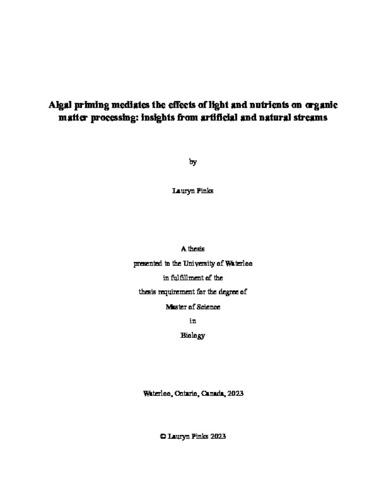| dc.contributor.author | Pinks, Lauryn | |
| dc.date.accessioned | 2023-10-31 14:31:08 (GMT) | |
| dc.date.available | 2023-10-31 14:31:08 (GMT) | |
| dc.date.issued | 2023-10-31 | |
| dc.date.submitted | 2023-10-13 | |
| dc.identifier.uri | http://hdl.handle.net/10012/20076 | |
| dc.description.abstract | Environmental factors such as light and nutrients may play important roles in determining detrital decomposition through their effects on primary production. Thus, human activities that alter the availabilities of light and nutrients may have direct consequences on organic matter (OM) processing and nutrient cycling in freshwater ecosystems. I compared heterotrophic function (OM processing and respiration) between two P levels (5 µg P L-1 and 51 µg P L-1) and two shade levels (0% and 80% shade) in natural streams, as well as 3 P levels (10 µg P L-1, 50 µg P L-1 and 100 µg P L-1) and 4 shade levels (0%, 50%, 80% and 100%) in artificial streams using the cotton-strip assay (CSA). Data from these experiments show a negative association between algal abundance (GPP and chlorophyll a) and recalcitrant OM (ROM) processing, implying a negative priming effect. Light was an important driver of negative priming which disproportionately affected ROM decomposition at lower P treatments over time. Overall, there were limited interactive effects between light and nutrient availability; rather, ROM processing was positively associated with P availability at all light levels while it was negatively associated with light availability at all P levels. There was no evidence to support positive priming (i.e., algal stimulation of ROM processing) in either experiment. Overall, results from this study illustrate the importance of considering light levels and nutrient availability when considering long term C and nutrient budgets in freshwater ecosystems. | en |
| dc.language.iso | en | en |
| dc.publisher | University of Waterloo | en |
| dc.subject | Decomposition | en |
| dc.subject | Cotton Strip Assay | en |
| dc.subject | Organic Matter Processing | en |
| dc.subject | Algal Priming | en |
| dc.subject | Biofilms | en |
| dc.subject | Heterotrophic Activity | en |
| dc.title | Algal priming mediates the effects of light and nutrients on organic matter processing: insights from artificial and natural streams | en |
| dc.type | Master Thesis | en |
| dc.pending | false | |
| uws-etd.degree.department | Biology | en |
| uws-etd.degree.discipline | Biology | en |
| uws-etd.degree.grantor | University of Waterloo | en |
| uws-etd.degree | Master of Science | en |
| uws-etd.embargo.terms | 0 | en |
| uws.contributor.advisor | Yates, Adam | |
| uws.contributor.affiliation1 | Faculty of Science | en |
| uws.published.city | Waterloo | en |
| uws.published.country | Canada | en |
| uws.published.province | Ontario | en |
| uws.typeOfResource | Text | en |
| uws.peerReviewStatus | Unreviewed | en |
| uws.scholarLevel | Graduate | en |

